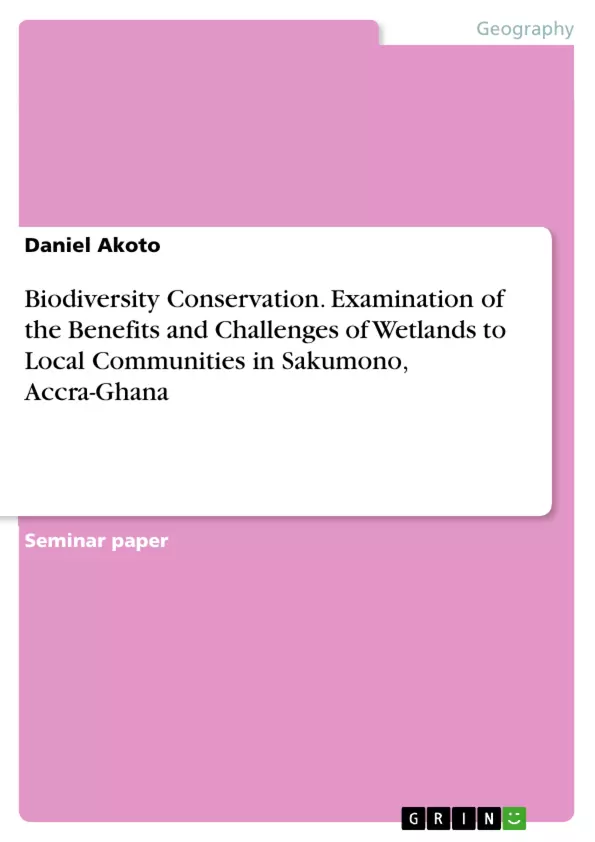This paper examines the benefits, challenges, and degree of willingness to conserve the Sakumono wetland through a participatory approach with the local community. It aims to determine the economic value of the ecosystem services in order to guide in the decision-making process for its future conservation as well as to sustain its ecological and socio-economical functions.
Considering the purpose and objectives of this paper the following guiding questions are addressed in the research: What are the benefits the communities derive from the Sakumono wetland? What challenges will the community be facing in their efforts to preserve the wetland and due to the presence of the wetland? What would they give to see the conservation of the wetland?
Wetlands are valuable ecosystems that occupy about 6 % of the world’s land surface. They comprise both land ecosystems that are strongly influenced by water, and aquatic ecosystems with special characteristics due to shallowness and proximity to land. Although various different classifications of wetlands exist, a useful approach is one provided by the Ramsar Convention on Wetlands. It divides wetlands into three main categories of wetland habitats: marine/coastal wetlands, inland wetlands, and man-made wetlands. The marine and coastal wetlands include estuaries, inter-tidal marshes, brackish, saline and freshwater lagoons, mangrove swamps, as well as coral reefs and rocky marine shores such as sea cliffs.
Inhaltsverzeichnis (Table of Contents)
- 1.0 INTRODUCTION
- 1.1 PROBLEM STATEMENT.
- 1.2 SIGNIFICANCE OF THE STUDY.
- 1.3 RESEARCH OBJECTIVE
- 1.4 RESEARCH QUESTIONS
- 2.0 LITERATURE REVIEW
- 2.1 Benefits Derived from Wetlands
- 2.2 Challenges Associated with Wetlands.
- 2.3 Community Willingness to Preserve Wetland.
- 3.0 RESEARCH METHODOOGY.
- 3.1 Description of the Study Area.......
- 3.2 Sampling and Data Collection.
- 4.0 FINDINGS AND DISCUSSIONS
- 4.1 GENERAL FINDINGS.
- 4.2 DISCUSSIONS.
- 5.0 CONCLUSION AND RECOMMENDATION..
- 5.1 Conclusion
- 5.2 Recommendation
Zielsetzung und Themenschwerpunkte (Objectives and Key Themes)
This research examines the benefits and challenges of wetlands to the local communities in Sakumono, Accra-Ghana. The study aims to determine the economic value of the Sakumono wetland ecosystem services, guiding future conservation efforts and ensuring the sustainability of its ecological and socio-economic functions. The study utilizes a participatory approach with the local community to assess the benefits they derive from the wetland, the challenges they face in preserving it, and their willingness to conserve it.
- The economic value of wetland ecosystem services
- Benefits derived from the wetland by local communities
- Challenges facing the local communities in preserving the wetland
- The extent to which the local communities are willing to conserve the wetland
- The challenges faced by local communities due to the presence of the wetland
Zusammenfassung der Kapitel (Chapter Summaries)
The introduction provides background information on the Sakumono Ramsar wetland, its importance for shorebirds, and the definition of wetlands according to the Ramsar Convention. The chapter highlights the ecological and economic significance of wetlands and outlines the problem statement, research objective, and research questions guiding the study. The literature review explores various aspects related to the benefits and challenges of wetlands, including the role of wetlands in filtering pollutants, regulating water flows, and mitigating coastal disasters. It also delves into community willingness to preserve wetlands. The research methodology chapter details the study area and the sampling and data collection techniques employed. While the findings and discussions chapter are not included here to avoid spoilers, it is expected to present the results of the study and analyze them in detail.
Schlüsselwörter (Keywords)
The primary focus of this research lies in the benefits and challenges of wetlands, particularly the Sakumono Ramsar wetland in Accra-Ghana. Key themes include the economic valuation of ecosystem services, the impact of wetlands on local communities, and the community's willingness to preserve these vital ecosystems. This study employs a participatory approach, involving local communities in the data collection and analysis processes, emphasizing the importance of community engagement in conservation efforts.
Frequently Asked Questions
What is the significance of the Sakumono wetland in Ghana?
The Sakumono Ramsar wetland is crucial for biodiversity, particularly as a habitat for shorebirds, and provides essential ecosystem services to local communities.
How do wetlands benefit local communities?
Wetlands offer benefits such as filtering pollutants, regulating water flows, mitigating coastal disasters, and providing resources for local livelihoods.
What are the main challenges in conserving the Sakumono wetland?
Challenges include balancing economic needs with ecological preservation and overcoming local issues related to the presence of the wetland itself.
Are local communities willing to preserve the wetland?
The research uses a participatory approach to assess the degree of willingness among locals, which is essential for sustainable conservation decision-making.
What categories of wetlands are defined by the Ramsar Convention?
The Ramsar Convention divides wetlands into three main categories: marine/coastal wetlands, inland wetlands, and man-made wetlands.
- Arbeit zitieren
- Daniel Akoto (Autor:in), 2018, Biodiversity Conservation. Examination of the Benefits and Challenges of Wetlands to Local Communities in Sakumono, Accra-Ghana, München, GRIN Verlag, https://www.grin.com/document/980391



